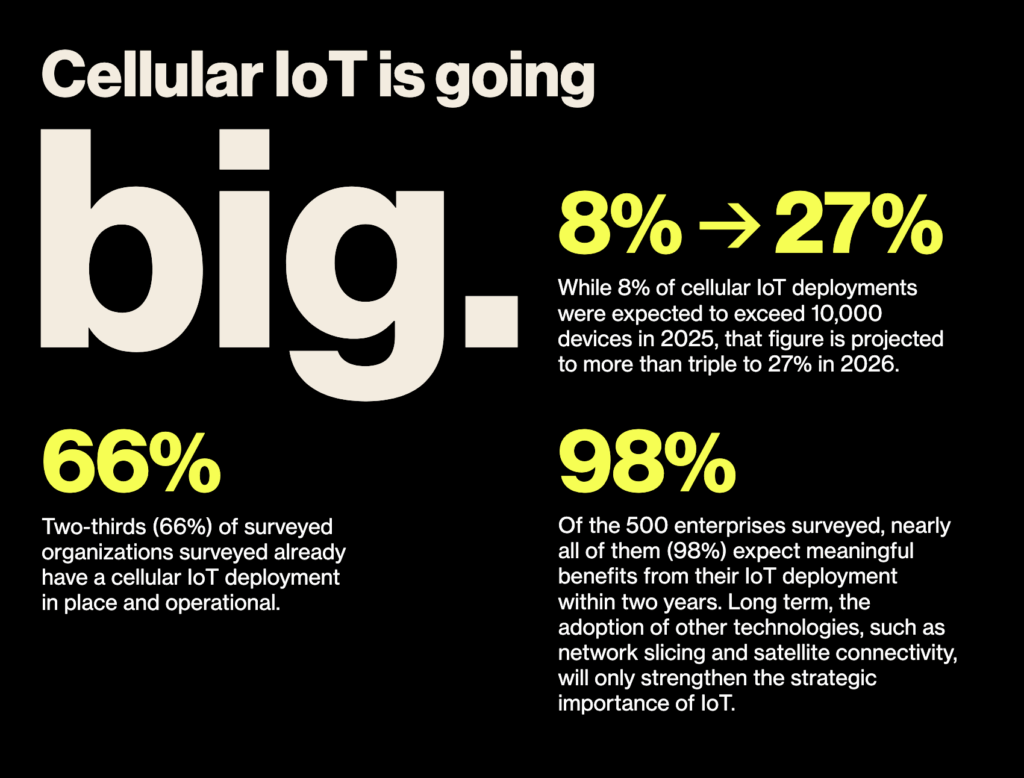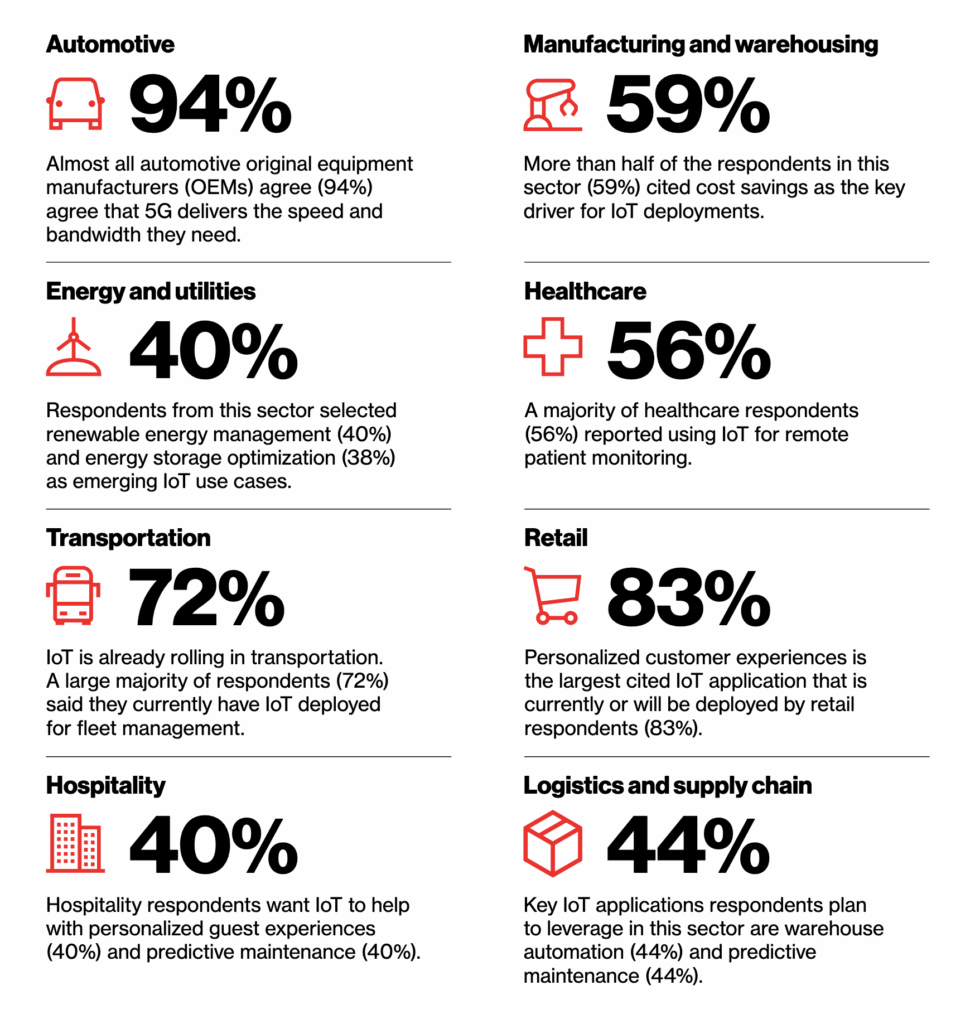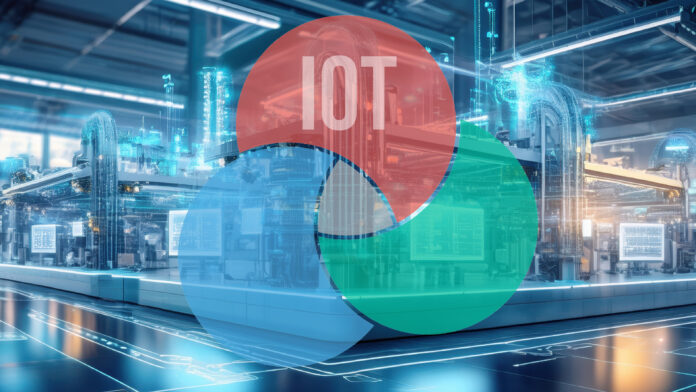IoT has always been more concept than category – like a loose collection of private device networks. And it makes increasingly good sense to enterprises alongside industrial 5G networks and industrial AI systems. New research from Verizon Business says IoT is finally “moving to centre stage” – with soaring optimism, rapid scaling, and deepening integration with private 5G and AI.
In sum – what to know:
Faster adoption – large-scale IoT deployments (10,000+ devices) are expected to more than triple next year, with most enterprises anticipating ROI within 12 months.
Parallel tech – industrial AI and 5G are driving IoT momentum; most enterprises see AI as key to IoT success, and over half plan to use private 5G in the next two years.
Industrial scope – from manufacturing and logistics to healthcare and energy, IoT is becoming the essential data engine for Industry 4.0 – if it wasn’t already.
Note: this article is the second in a short three-part series about the new tech foundations of Industry 4.0: industrial 5G (private wireless), industrial IoT, and industrial AI – linked but distinct technologies that form the connective, sensory, and cognitive layers of modern industry, driving digitalisation in hard-nosed industrial environments. Here is part two, based on figures from Verizon Business, with some market-sizing about the state of the IoT market. Part one (5G) and part three (AI) are available here and here.
RCR Wireless always said this about ‘the internet of things’ – that the terminology is useful as a concept, but kind of hard-to-pin-down as a technology. Because really, in the end, these are lots and lots of internets-of-things, and really just private networks of them, whether they are standalone sensor devices or embedded sensor modules, integral to much bigger and more-complex things – like robots or cars. And if they are ever connected to the internet in the cloud, their data is never supposed to be shared outside of strict corporate boundaries.
So yeah, brilliant concept, completely useful, but impossible to talk about in isolation – of industrial networks (5G, say), industrial analytics (AI). But IoT is “moving to centre stage”, says Verizon Business.
The firm has a new report about IoT, based on a survey of 500 enterprises, which covers it all, and says how closely these technologies are related – IoT data on 5G networks to AI software for corporate ends. “IoT a smart bet, AI a major accelerator,” it concludes, finding “soaring enthusiasm” for IoT and “multiple emerging technologies acting as catalysts”. Verizon Business writes: “5G, private networks, and eSIM are cited as cornerstones of enterprise IoT infrastructure. RedCap, slicing, and satellite are priorities for many.”
So what do the stats say? Firstly, they say that big enterprises like IoT. Deployments of over 10,000 devices will more than triple (!!!) next year, apparently – among respondents, if their plans pan out. They also say that IoT works in ROI-terms, and is driving more investments in it. More than half cite efficiency and productivity gains; almost everyone (98 percent) expects “real benefits” within two years. “Most anticipate returns in less than 12 months,” says Verizon Business. I mean, if these numbers are reflective, has there ever been such unbridled enthusiasm for IoT?

Maybe it’s because everyone loves AI – and because AI makes private IoT smart. Eight-four percent of enterprises think AI is key for IoT, and 70 percent have accelerated their IoT deployments accordingly; 82 percent have combined AI with camera (just an IoT-thing) data for real-time decision-making. Most (87 percent) say systems integration support (“from a mobile network operator”) is “important or critical” for IoT, and half (52 percent) intend to use private 4G/5G networks for their IoT projects in the next 12-24 months – a 24 percent jump “over current usage”.
Some other interesting stats: three quarters (74 percent) of companies plan to adopt reduce-capability 5G (5G RedCap); the same percentage expect to integrate satellites into their IoT roadmaps; more (78 percent) see network slicing as essential to customizing IoT performance; and eSIM adoption is surging (up 240 percent on the company’s own ThingSpace platform). A notable proportion (43 percent) say cybersecurity is their biggest IoT hangup, likely also accelerated by AI. There are some choice pull-out stats by vertical discipline below.

Daniel Lawson, senior vice president of global solutions and IoT at Verizon Business, said: “IoT is a data powerhouse. An enterprise’s connected machines, IT systems, and overall operations produce an enormous amount of data – location, condition, anomaly, threat, operational progress and continuity, and so on. IoT is how that data gets collected and parsed to provide businesses with insights about how things are going and how they can be improved. This survey tells us that IoT is highly valuable and scalable, when implemented correctly, and is about to get a lot more interesting and dynamic with AI and other emerging technologies.”
The full survey from Verizon Business is available here.

